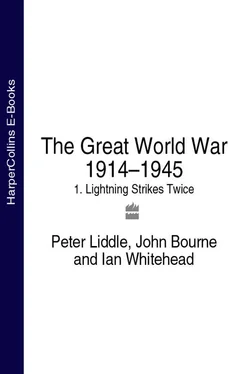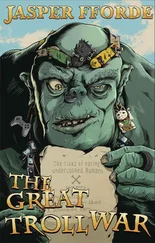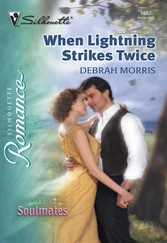It must have been either January or February 1915, certainly when there’d been a lot of snow, that the division was inspected by Kitchener. We were all drawn up along miles of road at Frensham Ponds on a bitterly cold day. Kitchener was late for some reason, so we were standing about in the snow for over an hour. A good many men were falling out or down.
All this time we were training pretty hard, and there was not much time for amusement, but we were now and again able to get up to London at weekends, where we had some very cheerful parties indeed. Of course we were all very keen to get to France. I shall never forget the shock we’d had earlier after the news of the Battle of the Marne, and then the advance from the Marne to the Aisne. We were all terrified the war would be over before we could get into it.’
Leaving the 9th, the regiment’s first-formed K1 battalion, shortly before it crossed over to France, let us return to the first days of the war and look at one of the four Territorial battalions.
On 7 August there arrived at 261 West Princes Street, Glasgow, Headquarters of the 5th Scottish Rifles (created in 1908 out of the 1st Lanarkshire Rifle Volunteers), a very tall, rather irate subaltern who some years later was to become famous as the first Director-General of the BBC. Lieutenant J. C. Reith had been working for the firm of Pearson in London as an engineer on a big dock-building project, but there had been confusion over his mobilisation orders, which had been incorrectly telegraphed to him. The muddle was eventually sorted out, and he joined his company as described in his book Wearing Spurs 2published in 1966, although he had actually written the account many years earlier:
‘A Territorial battalion mobilised – On Active Service – a curious and interesting spectacle. We who had been amateurs had become professionals; what we had done in odd moments, voluntarily and in a sense unofficially, was now full-time, compulsory and very official. The authority of officer and NCO, in general the run of military law, had been observed almost on sufferance and on occasion; now they were mandatory and permanent. From being rather farcical, an officer’s job had suddenly become very serious; the play-hour had merged into life itself and turned solemn reality – all rather bewildering. Camp each year was mobilisation of a sort, but the period was limited to a fortnight, and we were not On Active Service. It was these words which made the circumstances and conditions and atmosphere radically different. Trivial faults became crimes; minor crimes became major ones. Officers commanding companies were instructed to impress upon their men the awful import of the term; to warn them of the penalties of disobedience or neglect of duty. My OC company was thoroughly in form to do so. The death sentence was frequently to be found in the rubric. “And you’re On Active Service now,” he would with portentous solemnity interpolate, and glare along the ranks. We had no doubt about it.
We were shortly “to proceed to the war station” which sounded interesting; and we were given identity discs: “Lieut J. C. W. Reith Pres 5th SR”. This, or rather what was implied, was something of a shock – the reference to one’s religious persuasion in particular; so early and so far from actual warfare to be presented with the credentials for burial and record. Moreover, but quite incidentally, Territorials were available for home defence only, and no one had said anything about foreign service, though I for one had no doubt we would go abroad. The company OC told me to wear the identity disc day and night, but that struck me as being premature. As a matter of fact it was not worn until May 1915 – and then only par cause de pous.
Where was this war station and whither had two or three of the officers and about a hundred of the men disappeared? I sought enlightenment of my OC, thinking we might be going to some vulnerable spot on the east coast; Falkirk, he told me. “Falkirk – what on earth for?” As to the others, it was secret; but he had no doubt they were “in the trenches”. I could not imagine what trenches there were in Scotland, nor why anyone should be living in them. His imagination was running away with him.
On Sunday morning, 9th, the Battalion paraded with its bands and marched down Great Western Road to church. It was an impressive performance. Every Friday night in pre-war drill seasons we had emerged from the seclusion of our training-ground and marched along the two miles of this spacious boulevard to a formal dismissal at Charing Cross. I never cared for this operation for, as senior subaltern of No 1, I had to walk beside the little company OC. The Territorials were always an object of amusement to a section of the community, and ribald youth along the route made the most of the sight of a very tall man in uniform marching by the side of a very little man. But it was different now. We had been playing at soldiers before; now we were soldiers. Status and potentialities recognised.’
Reith spent ten days at Falkirk before being detached with 60 men to guard two vulnerable points on the railway line south from Perth in the region of Larbert. For four happy weeks he ran his detachment in his own way with no interference from any senior officer. Then came the time to rejoin the battalion, when, soon after 20 September, the main body moved to Larbert as well:
‘Next morning, with a heavy heart, I set out to attend an ordinary battalion parade which was to be followed by a route march. A route march! I was met by an orderly room messenger. He handed me a note from the Adjutant instructing me to take over command of Transport. Gosh, what a joy this was; the sun shone in an unclouded sky.
The Transport Officer was a somebody; an object of mystification, envy and even respect among his brother officers. He was not, as they, subject to parades and orderly duties. He was a power in the land; one with whom it was expedient to be on friendly terms; he could perform or withhold all sorts of services… Transport Officer. Magnificent – like the gold star.
The major issues of war are in the hands of God, politicians and the general staff. The regimental officer, realising his helplessness, is not greatly concerned about them. Apart from discharging to the best of his ability the particular little task allotted to him he is not exercised with schemes for the rout of the enemy. Beyond satisfying himself that there is an appropriate depth of sand or earth on his dugout roof, and choosing when available a cellar instead of an attic (or at any rate a room before reaching which a shell would have to pass through at least one other) the chances of his own survival and the general progress of the campaign do not figure much in his mind. He has too much else to do, and in the doing of them the Transport Officer is often of determining importance. A horse and cart at the right moment, or a few cubic feet of space in a cart, may make all the difference to his outlook on life. They may make war tolerable and perhaps, for the time being, enjoyable. A mighty and beneficent power to wield. Transport Officer 5th SR.’
For nearly all the men in the various units of the regiment, the first months of the war involved making many adjustments to military life. This applied to the Regular 1st Battalion, (always known as the Cameronians while the others were called the Scottish Rifles) because it was made up largely of reservists. With the 2nd being always kept up to strength at its overseas station in Malta, the 1st was usually short of men, especially during the summer trooping season when it sent out drafts of newly trained soldiers to its linked battalion. Thus in August 1914 it was ready to absorb all the reservists that came back to the colours, some of whom had been firmly settled in civilian life for many years. Although the men in the TF had a little military experience, their training, in Reith’s words, had been ‘done in odd moments and in a sense unofficially’. Naturally the New Army volunteers had the most adjusting to do, but the Regular reservists and TF men had their share of adapting, or readapting, themselves to military routine as well.
Читать дальше












